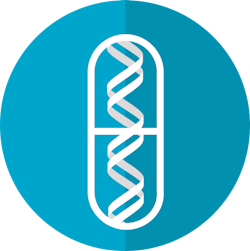As pharmacogenomics becomes more common, the need to standardize best practices for detecting genetic variations in patients through testing becomes more important.
That is why the Association for Molecular Pathology (AMP) is developing testing guidelines for pharmacogenomic assays. To do so, it is working with other professional organizations, including the College of American Pathologists and the Clinical Pharmacogenetics Implementation Consortium.
Pharmacogenomics is the study of the effect of genomic variations on drugs. This involves how people metabolize medications, move them in and out of the bloodstream, and bind them to a target in the body.
The goal is to find the correct medication and dosage for each patient based on his or her genetic makeup.
Metabolizing medications
One area of pharmacogenomics in which scientists have actionable information involves how fast or slow people metabolize medications. The rate at which a person metabolizes a drug impacts the dose needed to obtain a therapeutic result. Prescribing too much or too little of a drug can cause an adverse drug event and potentially harm a patient.
The enzymes involved in metabolizing and clearing many medications, which are encoded by the P450 genes, include CYP2D6, CYP2C19, CYP2C9, CYP3A4, and CYP3A5, which mostly occur in the liver. 1
While there are some pharmacogenomic tests approved by the U.S. Food and Drug Administration (FDA) and marketed commercially, most assays are lab developed tests (LDTs) that are performed at private specialized labs, large reference labs, or labs associated with academic medical centers.
“Knowledge has changed rapidly, so when there’s a platform that gets FDA cleared, it’s sort of frozen in time. The platform doesn’t evolve, and that does cause issues,” said Pratt, who also is the chair of AMP’s PGx Working Group.
On the other hand, LDTs can be developed or revised more quickly than commercial, FDA-approved assays.
As an example, Pratt cites tests to detect variant genes associated with warfarin sensitivity. One of the FDA-cleared assays does not include important variants that are common in the African American population, which means the test is not useful for this group. The lack of information about variant genes is particularly problematic for warfarin, because the medication has a narrow dosing range that varies by individual.
Another problem in the field of genotype testing is that clinical assays vary widely in the variant genes detected, and the nomenclature used to express test results, making interpretation of the tests difficult for physicians, Pratt said.
AMP guidelines
To address this problem, AMP has published four guidelines so far. Each guideline recommends a minimum set of alleles and their defining variants that should be included in an assay, known as tier 1, and an extended panel of alleles, tier 2.
The goal of the guidelines is to standardize what alleles are detected by a test. “If one laboratory does a lot of variants, it may report something different than a laboratory that reports fewer variants, because that rarer variant was not detected in a test. You can get discrepant results between laboratories, and it relates to platform differences,” Pratt explains.
Another objective of the working group, she adds, is to create “standardization that is pan-ethnic and makes sure that all the ethnicities are largely represented, which helps ensure an equality in testing.”
The guidelines AMP has published so far are for the following:
- CYP2C9, which is involved in the metabolism of warfarin, several blood pressure medications, numerous nonsteroidal anti-inflammatory drugs (NSAIDs), oral hypoglycemic agents, and others.2
- CYP2C19, which is involved in the metabolism of the antiplatelet medication clopidogrel (Plavix), proton-pump inhibitors, and the antidepressants citalopram and escitalopram. 3
- CYP2D6, which is involved in the metabolism of about 21% of all medications, including many opioids, such as codeine; anti-depressants; beta blockers; typical and atypical antipsychotics; and antiemetics.4
Warfarin, which is metabolized by CYP2C9, CYP4F2 and VKORC1.
Several other guidelines, which Pratt chose not to disclose, are in the works. She also notes that the development process is an ongoing endeavor. Once the members of the working group have addressed the genotyping assays on their list, they plan to review the guidelines they have already created. “Information changes over time,” Pratt notes, so the goal is to assess and potentially update guidelines. Explaining the process, she says, “What did we get right? What did we get wrong, and where do we need to alter our recommendations?”
References:
- Dunbar S. Pharmacogenomics: How genetic testing is making therapeutics safer and more effective. Medical Laboratory Observer. https://www.mlo-online.com/molecular/genetic-testing/article/13008847/pharmacogenomics-how-genetic-testing-is-making-therapeutics-safer-and-more-effective. Published September 22, 2016. Accessed July 6, 2021.
- Daly A, Rettie A, Fowler D, Miners O. Pharmacogenomics of CYP2C9: functional and clinical considerations. J Pers Med. 2018 Mar; 8(1): 1. doi: 10.3390/jpm8010001.
- Pratt V, Tredici A, Hachad H, Ji Y, Kalman L, Scott S, Weck K. Recommendations for clinical CYP2C19 genotyping allele selection: a report of the Association for Molecular Pathology. J Mol Diagn. 2018 May;20(3):269-276. doi: 10.1016/j.jmoldx.2018.01.011.
- Pratt V, Cavallari L, Del Tredici A, van Schaik R, Whirl-Carrillo M, Weck K. Recommendations for clinical CYP2D6 genotyping allele selection: A joint consensus recommendation of the Association for Molecular Pathology, College of American Pathologists, Dutch Pharmacogenetics Working Group of the Royal Dutch Pharmacists Association, and European Society for Pharmacogenomics and Personalized Therapy. J Mol Diagn. (2021). doi.org/10.1016/j.jmoldx.2021.05.013.


